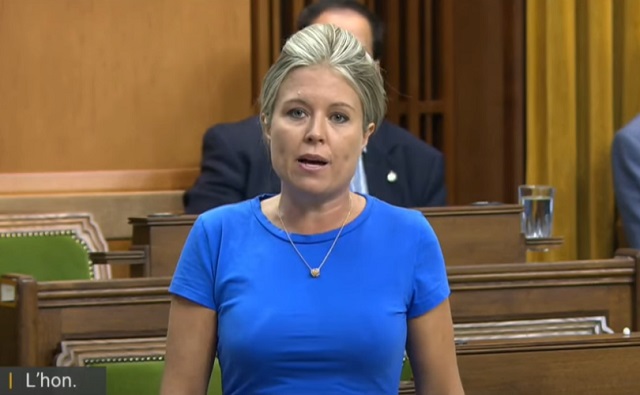Censorship Industrial Complex
Conservatives to introduce bill that aims to ‘expressly prohibit’ digital IDs in Canada

From LifeSiteNews
MP Michelle Rempel Garner said the goal is to ‘protect the most vulnerable Canadians without creating a government-managed surveillance state or restricting Charter-protected speech.’
Canada’s Conservative Party promised to introduce a new online harms bill that will counter legislation from Prime Minister Justin Trudeau’s Liberals that aims to further clamp down on online speech.
Conservative MP Michelle Rempel Garner, speaking to reporters on September 12, said the new Conservative bill will “protect Canadians online” and preserve “civil liberties.”
“After nine years of Justin Trudeau, the NDP-Liberal coalition has failed to put forward any legislation that will protect Canadians online without infringing upon their civil liberties,” she said, adding that “Canadians are paying the price for this failure.”
Rempel Garner added that online criminal behaviour is “still rampant” in Canada, “yet the Liberals’ only response has been to table two censorship bills, forcing Canadians to choose between their safety and free expression.”
In a blog post about the forthcoming legislation, Rempel Garner observed that “for nearly a decade, the Liberals have presented Canadians with a false dichotomy; that they should have to water down their civil liberties to be protected online.”
She made a direct reference to the Liberal’s Bill C-63, or the “An Act to enact the Online Harms Act, to amend the Criminal Code, the Canadian Human Rights Act and An Act respecting the mandatory reporting of Internet child pornography by persons who provide an Internet service and to make consequential and related amendments to other Acts.”
Bill C-63 was introduced by Justice Minister Arif Virani in the House of Commons in February and was immediately blasted by constitutional experts as troublesome. Put forth under the guise of protecting children from exploitation online, the bill also seeks to expand the scope of “hate speech” prosecutions, and even desires to target such speech retroactively.
Trudeau’s law, which is in the second reading, also calls for the creation of a Digital Safety Commission, a digital safety ombudsperson, and the Digital Safety Office, all tasked with policing internet content.
Rempel Garner promised the Conservative’s online harms bill will “introduce protections in three areas of focus,” and will “protect the most vulnerable Canadians without creating a government-managed surveillance state or restricting Charter-protected speech.”
“To be clear, this update won’t criminalize something like two people disagreeing about policy online, or other types of expression of opinion that is protected under the Charter, which Liberal Bill C-63 will undermine,” Rempel Garner noted.
“Specifically, the provision in our new Conservative legislation will be based on the existing definition of criminal harassment, applying specifically to those who repeatedly send unwanted, harassing content that causes someone to reasonably fear for their safety or well-being.”
Conservative bill will not mandate Digital IDs for internet use
Rempel Garner observed that the new bill will have provisions to protect minors and will criminalize the sharing of “intimate” photos without a person’s consent, as well as “deep nudes” (AI images that look real), as well as the sharing of pictures or video of sexual assault.
“The legislation will outline in detail how operators must comply with and operate under this duty of care, including reporting requirements, marketing prohibitions, and other items. Operators who don’t comply with these provisions will face steep fines and a private right of action,” she said.
Rempel Garner said the Conservative’s new bill will look to implement privacy-preserving and “trustworthy age verification methods (for example, computer algorithms that ensure reliable age verification) to detect when a user is a minor,” to be able to restrict access to any “content that is inappropriate for minors to such users while expressly prohibiting the use of a Digital ID for these purposes.”
In June, Rempel Garner said Trudeau’s Bill C-63 is so flawed that it will never be able to be enforced or come to light before the next election.
C-63’s “hate speech” section is accompanied by broad definitions, severe penalties, and dubious tactics, including levying preemptive judgments against people if they are feared to be likely to commit an act of “hate” in the future.
Details of the new legislation also show the bill could lead to more people jailed for life for “hate crimes” or fined $50,000 and jailed for posts that the government defines as “hate speech” based on gender, race, or other categories.
Jordan Peterson, one of Canada’s most prominent psychologists, accused Trudeau’s Bill C-63 of trying to create a pathway to allow for “Orwellian Thought Crime” to become the norm in the nation
Censorship Industrial Complex
UK mother imprisoned over tweet says she was ‘political prisoner’ of Keir Starmer

From LifeSiteNews
Lucy Connolly, a former child-care worker, was given a 31-month sentence after slamming illegal immigrants in response to the murder of three little British girls.
A mother from the U.K. who spent over a year in prison for an ill-advised tweet has said she was a “political prisoner” of Prime Minister Keir Starmer.
In a recently released, hour-long interview with The Telegraph, Lucy Connolly shared her story of how she was sent to jail for allegedly stirring up racial hatred in a social media post that she deleted only hours after it was published.
When the interviewer asked if she was Keir Starmer’s political prisoner, she replied, “Absolutely.”
Connolly is a 42-year-old wife, mother, and former childminder. Last year, she made an angry post on X after a migrant had killed three girls at a Taylor Swift-themed dance class in Southport.
She wrote: “Mass deportation now set fire to all the effing hotels full of the bastards for all I care. While you are at it, take the treacherous government and politicians with you. I feel physically sick knowing what these families will now have to endure. If that makes me racist, so be it.”
In the interview with The Telegraph, she said she “was not thinking rationally” when she posted the statement. Thinking better of it, Connolly deleted the ill-advised post a few hours later. However, someone had already screenshotted the tweet and reported her to the police.
Connolly told the interviewer that she was not racist and that 90 percent of the families of the children she took care of had immigration backgrounds. She stated that she even helped them with their visa applications and only opposes illegal and unvetted immigration to the U.K.
Eight days after she sent and deleted the tweet, police showed up at her house and arrested her for inciting racial hatred.
Connolly said that because of the charged political climate at the time around the immigration issue, it appears that Prime Minister Keir Starmer’s government wanted to make an example of people like her who held the government responsible for the wave of migrant crime.
As the allegedly racist wife of a Tory counselor, she fit the bill perfectly for Labour Prime Minister Starmer.
According to her lawyer and legal counselors ”these weren’t normal circumstances” and ”they were giving out a lot heftier sentences to people than they ordinarily would.”
On August 4 last year, Starmer made the following statement in response to the protests against the migrant violence: “ I utterly condemn the far-right thuggery. Be in no doubt that those who have participated in violence will face the full force of the law. The police will be making arrests. Individuals will be held on remand. Charges will follow, and convictions will follow. I guarantee you’ll regret taking part in this disorder, whether directly or those whipping up this action online.”
“ Lucy, you were denied bail six days after the prime minister made that statement,” the interview told Connolly.
”You were a perfect candidate for bail, first-time offender, not a flight risk, but bail was denied. It was denied twice. Lucy, do you think Keir Starmer influenced the way you and others were treated by the criminal justice system?”
”A hundred percent, yes,” she replied.
Connolly suffered abuse during her time in prison
As Connolly was imprisoned and held on remand and could not see her daughter, she worried that if she tried to fight the case, the trial could be delayed for months or years, making it impossible for her to be with her family.
So Connolly, upon advice of her attorney, pleaded guilty to the charges of stirring up racial hatred in hopes of getting a lenient sentence.
”I have a daughter that needs me. You know, I’m a stay-home mommy. She’s had me there her whole life, and all I was thinking was, what is my quickest route to her?” she explained.
The 42-year-old mother could provide many mitigating factors, like her previous good character, a pile of references from immigrant parents who said that she was a very kind person, and the fact that she lost her son in 2011 due to medical neglect, which left her with post-traumatic stress disorder.
However, the judge did not give any weight to these factors nor to the fact that she pleaded guilty and instead slapped her with a 31-month custodial sentence.
Connolly said that even though she showed exceptional behavior in prison and all the officers liked her, all her attempts at probation were denied, while those who committed more serious crimes were often granted probation.
“They were done for death by dangerous driving for very serious crimes, but they were allowed out. And you, who had a 12-year-old daughter and a husband with a bone marrow condition, constantly told no,” the interviewer said.
One of the reasons the authorities gave for denying probation was that “the media interest is too high” in her case, even though the Ministry of Justice does not list that as one of the possible reasons.
During her time in prison, Connolly also had a run-in with a counter-terrorism group, who she said unnecessarily handcuffed her and hurt her to send a message.
“The handcuffs were so tight they couldn’t get them off. And there was all bruises all over my arms. And I’ve still got, I need to go to a chiropractor about my back and my shoulder because they hurt me so badly, and it was completely unnecessary,” she said, recalling the incident.
“Different officers do it different ways, but they can really hurt you if they want to. And they decided on that day they were gonna really hurt me, and I mean, really hurt me.”
A wave of support and an unbroken spirit
Connolly said she received much support, including a crowdfunder that raised nearly 160,000 pounds for her.
”I, for some reason, seem to have had the most coverage, but there are people who are in equally awful situations that shouldn’t be in there. And we should also be fighting for them and remembering them, and when they come out, give them the same support as what I’m getting from people as well,” she said.
She noted that she will continue to fight for freedom of speech in Britain and that she will meet a senior representative of the Trump administration.
In May, the U.S. government announced it would send a team of officials to the U.K. to investigate concerns over free speech restrictions. Trump said that the U.S. was “monitoring” Connolly’s case.
The 42-year-old mother closed with fiery remarks, stressing that her spirit was not broken and that she would continue to fight.
”You won’t keep me down.”
“Like I said to all the people that you know during the [time] I was sent to prison, think it’s a good thing, think it’s funny, hope that they broke me while I was in there.”
“But I’m here to tell you that they didn’t. And I hope that I can use my experience to now do good, to reform the system, to hopefully make people listen to me,” she concluded.
Banks
Debanking is Ottawa’s quiet tool to crush dissent

This article supplied by Troy Media.
 By Lee Harding
By Lee Harding
The rise of debanking threatens free speech and financial rights. Canadians have a right to be worried
If you thought bank account freezes ended after the 2022 convoy, think again. “Debanking”—the practice of banks abruptly closing accounts, often without a clear explanation—is on the rise in Canada and the U.S., and it’s fast becoming a tool to silence dissent.
Alberta lawyer Eva Chipiuk is a recent debanking victim. On July 17, the Royal Bank of Canada (RBC) sent her a letter saying she could no longer have an account there. She posted RBC’s letter, which offered little explanation beyond stating her recent account activity was “outside of RBC’s client risk appetite,” on X. She was told to transfer her funds to another financial institution within 31 days.
In an interview with the Financial Post, Chipiuk said she had made two $1,000 transfers to cryptocurrency platform Shakepay Inc. over two consecutive days to buy Bitcoin. The second transfer was blocked by the bank and triggered an account freeze. She went to the bank to have her account restored. A few days after succeeding, she received the letter saying her accounts would again be closed until mid-August.
While banks often flag cryptocurrency transactions for review because of antimoney-laundering regulations, such activity is lawful.
If that alone were grounds for debanking, more than four million Canadians would be at risk. According to the Triple A Global Cryptocurrency
Report, about 10.1 per cent of Canadians own cryptocurrency.
However, buying crypto does not appear to be the real reason. Chipiuk represented protesters from the Freedom Convoy, which began in
opposition to COVID-19 vaccine mandates and sweeping pandemic restrictions, and cross-examined then-prime minister Justin Trudeau
in 2022 at the Public Order Emergency Commission hearings in Ottawa.
In 2022, Canadian banks froze $7.8 million from 200 accounts related to the convoy. A single mother in B.C. complained to her MP, Mark Strahl, that her bank account was frozen after giving a $50 donation to the convoy, which was legal at the time. In response, the prime minister and deputy prime minister said financial measures were meant only to target convoy leaders.
The convoy is over, but debanking is not. The Ombudsman for Banking Services and Investments opened 94 cases related to debanking in 2024 and 105 in 2023. A spokesperson for the organization told the Financial Post: “We are not able to challenge or change a bank’s decision. We are also generally not able to tell the consumer the bank’s reason for account closure.”
Debanking has also emerged as an issue in the United States. U.S. President Donald Trump complained about it in his Jan. 20 video conference with the World Economic Forum. He told Brian T. Moynihan, chair, president and CEO of Bank of America: “I hope you start opening your bank to conservatives because many conservatives complain that the banks are not allowing them to do business.”
Democratic Senator Elizabeth Warren agreed. At a Senate committee hearing on Feb. 8 entitled “Investigating the Real Impacts of Debanking in America,” she said: “Donald Trump was onto a real problem when he criticized Bank of America for its de-banking practices.”
Warren said de-banked U.S. customers “all reported common themes,” namely: “No warning. No explanation. No chance to dispute or appeal. They described how one day, all of a sudden, they lost their place in the banking system.” The Consumer Financial Protection Bureau has received 12,000 debanking complaints over the past three years. Georgia, Florida and Tennessee have introduced laws to curb debanking.
A completely de-banked person is left with only cash, but in Canada, Bill C-2 could significantly worsen their predicament. If passed, federal law will ban cash transactions of $10,000 or more to a business or non-profit for any given thing, whether that amount is in a lump sum or a series of payments.
Encroachments on free speech and financial rights are paving the way for a dystopian future, where those who refuse to bow to government diktat or bankfavoured ideologies are shut out of the financial system.
Canadians and Americans must defend their freedoms now, before a digital technocracy emerges to cancel and crush dissent.
Lee Harding is a research fellow for the Frontier Centre for Public Policy
Troy Media empowers Canadian community news outlets by providing independent, insightful analysis and commentary. Our mission is to support local media in helping Canadians stay informed and engaged by delivering reliable content that strengthens community connections and deepens understanding across the country.
-

 Addictions20 hours ago
Addictions20 hours agoWhy North America’s Drug Decriminalization Experiments Failed
-

 Business21 hours ago
Business21 hours agoDisney scrambles as young men reject DEI-filled franchises
-

 Alberta19 hours ago
Alberta19 hours agoGood Sense Beats Team Canada’s Hysteria
-

 Health18 hours ago
Health18 hours agoThe Hidden Risk of an Abortion
-

 Alberta14 hours ago
Alberta14 hours agoNew Calgary plant to produce luxury vinyl flooring with Alberta oil and gas
-

 Business17 hours ago
Business17 hours agoCarney’s housing plan will likely spend a lot for very little
-

 COVID-1915 hours ago
COVID-1915 hours agoSudden deaths, incapacitations soar among COVID-jabbed airline pilots: report
-

 Bruce Dowbiggin16 hours ago
Bruce Dowbiggin16 hours agoWhere Carney’s Canada Now Stands : Elbows Up. Pants Down.


